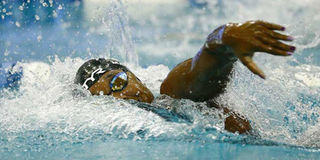Benefits of swimming for your fitness

Experts say an hour of swimming burns almost as many calories as running, without all the impact on your bones and joints.
The length of time one swims can vary depending on how talented one is and the amount of training they have had. Swimming is a necessary survival skill that comes with other fitness related benefits.
It relaxes the mind; thereby helping you to relieve stress, can heal body aches, especially those relating to bad posture or even repetitive physical injuries that one gets while exercising at the gym.
The most observable benefit of swimming according to Matovu Wasswa, a swimming couch at Fairway Hotel, is good body posture.
“All swimming techniques require one to control their breath and, therefore, are an important breathing exercise. Swimming requires proper coordination, use of your arms, legs, neck, abdominal and back muscles for one to stay afloat.”
Benefits
Swimming improves your breathing and endurance, which are both necessary for effectiveness while engaging in different strengthening or aerobic exercises. It also helps in weight loss if coupled with another aerobic activity and disciplined nutrition habits.
Alex Kitandwe, an IT specialist, says he learnt how to swim as a child and swims whenever he feels pain as a result of oversitting while working.
“The breast stroke is my best. It not only strengthens chest muscles but also relieves shoulder pains,” Kitandwe says.
Dr Nobert Bwana, a physiotherapist at Physique Fitness Centre, says the front and back strokes help to strengthen your abdominal muscles, improve general posture, back muscles, and leg muscles (lower limbs).
“The butterfly stroke is a more aggressive stroke that helps to strengthen your upper back, shoulder and chest muscles. It is the most difficult swimming technique since it involves a lot of energy and endurance,” he says.
Swimming can be used to treat movement dysfunction by a physiotherapist who has had special training in hydro-therapy according to Dr Bwana. Hydro-therapy can be used to treat balance, muscle weakness, gait, arthritis, back problems coordination and gait (re-educating how to walk normally).
Caution
If you are hypertensive, asthmatic or allergic to cold temperatures, consult your physician before taking on swimming. Although such illnesses cannot hinder you from swimming, it is important that you notify your instructor about your health condition.
Kitandwe warns that people avoid taking drugs or alcohol before entering a swimming pool. One may not be able to judge that they are in pool which could lead to drowning.
“If one is swimming and active in water, their body generates enough heat to keep them from feeling cold. However, long distance swimmers and learners who just stand in the pool without getting out to sun bathe can get hypothermia evidenced by goose bumps, shivering and in extreme cases, disorientation,” Dr Bwana says.
Avoid diving in shallow waters because you may hit your head on the pool floor during a dive. Also, remember to stretch and warm up before swimming to reduce the risk of a muscle pool as you swim.
The frequency
Different bodies adjust to swimming according to their formation. Female bodies float faster than men because men naturally use a lot of energy that is likely to bar them from water until they are used.
A good swimming programme can be 20 to 30 minutes of swimming each day, three days a week.
“However, in order to get excellent results for your physical body goals, combine it with another exercise programme such as strength training using weights in a gym or aerobic exercises depending on whether your goal is to improve your muscle or decrease your body fat ratio. Remember to have a balanced diet if you want to achieve the best results,” says Matovu.
Before you swim
According to Matovu Wasswa, a swimming couch at Fairway Hotel, proper caution must be taken before you get into the pool to prevent accidents and infections.
•Take a proper bath before entering a swimming pool.
•Ensure that you have the appropriate, fitting swimming wear. Do not enter the pool while wearing accessories such as a necklace.
• Ensure that there is a professional life guard close by watching you and ask them where the deep and shallow end is. It is important that you let the life guard know that you are a learner.
• Ensure that you register proper details concerning your address in case of a swimming-related accident.
• For beginners, ensure that you swim next to the wall, in case you get tired and need to hold on to something.




